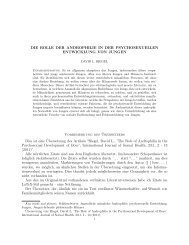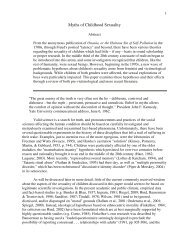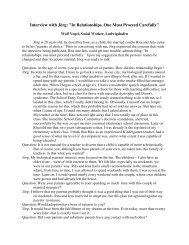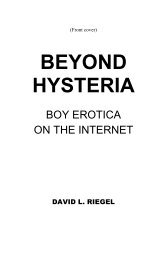Mildenberger Page 1 (German) Journal of Sex Research ... - Shfri.net
Mildenberger Page 1 (German) Journal of Sex Research ... - Shfri.net
Mildenberger Page 1 (German) Journal of Sex Research ... - Shfri.net
You also want an ePaper? Increase the reach of your titles
YUMPU automatically turns print PDFs into web optimized ePapers that Google loves.
<strong>Mildenberger</strong> <strong>Page</strong> 2<br />
On the strength <strong>of</strong> his research, though only thirty years old at the time, he was hired as a lecturer<br />
in physiology at the University <strong>of</strong> Vienna. As an indication <strong>of</strong> his strong position in scientific<br />
circles the following situation is notable: In 1895 -- still prior to the beginning <strong>of</strong> his career as a<br />
pamphleteer -- he was asked to write a hagiographic obituary for Karl Ludwig (1816-1895). [E8]<br />
In his first draft, Beer went into the potential for physiology to explain the mechanisms <strong>of</strong> the<br />
nervous system in terms <strong>of</strong> the operation <strong>of</strong> the senses. [E9] In connection with this he stressed<br />
the necessity <strong>of</strong> extensive research, leaning upon the preliminary work <strong>of</strong> a colleague with whom<br />
he was to form a close collaboration in the years following: Jakob von Uexküll (1864-1944).<br />
([E9] pg. 870) The two had gotten to know one another at the <strong>German</strong> Zoological Station in<br />
Naples, where Uexküll had just been conducting research into the station's work methods. ([E16]<br />
pg. 821) Beer also met the Strasbourg physiologist Albrecht Bethe here. All three believed in the<br />
objective investigation <strong>of</strong> the lives <strong>of</strong> animals by means <strong>of</strong> more mechanistic thought processes,<br />
so as to make possible the realization <strong>of</strong> more wide-ranging conclusions, including with regard to<br />
more advanced life-forms. [F1] The cohesion among Beer, Bethe, and Uexküll was considerable.<br />
When Bethe started a quarrel over the classification <strong>of</strong> ants and bees as "reflex-machines,"<br />
thereby drawing his two colleagues into it, the Jesuit priest Erich [334] Wasmann and the Swiss<br />
psychiatrist August Forel entered the fray, committing themselves, in addition to Uexküll and<br />
Beer, to Bethe’s cause. In connection with this it must be mentioned that at this same time Bethe<br />
was sketching out a brand new, modern theory <strong>of</strong> neurophysiology which he realized, after years<br />
<strong>of</strong> research, threatened to crowd out Porel's own views on the matter. ([E17] pp. 96-103)<br />
Though Beer was far from being an uncritical devotee <strong>of</strong> Bethe’s views ([E11] pp. 205-208), he<br />
did discuss his colleague's work in a positive light, while rejecting the theories <strong>of</strong> August Forel.<br />
[E10] Uexküll focused on refuting Wasmann, whose studies he discounted as "old hat." ([ES7]<br />
pg. 502) At the high point <strong>of</strong> the discussion Beer, Bethe, and Uexküll together sketched out a<br />
new, "more objectively-oriented nomenclature," with which they on the one hand banished<br />
anthropomorphic assessments from animal psychology and physiology, and on the other hand<br />
sought to: redefine the entire discourse through the adoption <strong>of</strong> novel, standardized concepts.<br />
[E60-E62] If Beer, Bethe, and Uexküll were thereby able to successfully cast themselves in the<br />
annals <strong>of</strong> science as the protagonists <strong>of</strong> a modern physiology and biology, biology and<br />
physiology would be rid <strong>of</strong> all forms <strong>of</strong> anti-mechanistic ideas. Along with a string <strong>of</strong> universityestablished<br />
researchers, however, even dyed-in-the-wool naturalists would reject such an<br />
operational foundation because otherwise, any potentially existing extra-mechanistic "life-force"<br />
would have the rug pulled out from under it from the very beginning. And so a new<br />
nomenclature for standardizing the discourse was established, the necessity <strong>of</strong> which was<br />
recognized even by the opponents <strong>of</strong> Beer, Bethe, and Uexküll, in spite <strong>of</strong> the former's united<br />
front <strong>of</strong> rejection. [E42, E64] This did not prevent Theodor Beer from defending the<br />
methodology which he had developed. ([E12] pg. 256) Acclaim for his avant-garde research into<br />
the physiology <strong>of</strong> sight wasn't lacking either: In 1900, Beer was awarded the prestigious Ignaz-<br />
Lieben Prize. Beer showed himself to be a committed opponent <strong>of</strong> prevailing opinion even<br />
beyond the scientific sphere. So he publicly positioned himself as a follower <strong>of</strong> the Freikorperkultur<br />
[ Freikorperkultur (FKK), literally 'free/open body culture,' is an organization -- even a<br />
social movement -- which promotes naturism/nudism.] and extensive athletic activity, and turned<br />
away from "old-fashioned, simple ideologies and pedantic, bleak ways <strong>of</strong> conducting one's life<br />
which sometimes lead to such feeble-minded vows <strong>of</strong> poverty, love <strong>of</strong> filth and contempt for<br />
bathing, pointless, monk-like turning away from the outside world and culture-hostile ascetic






